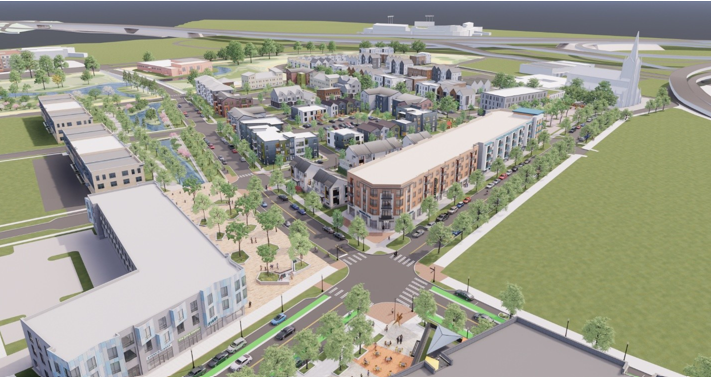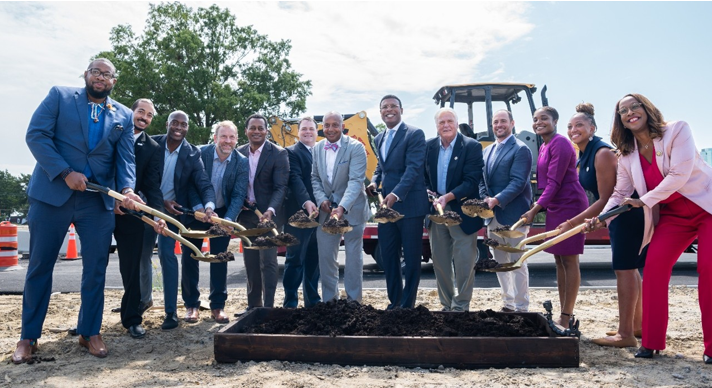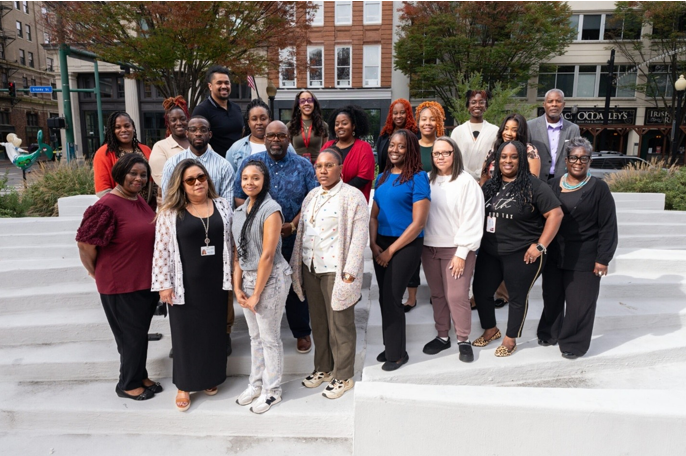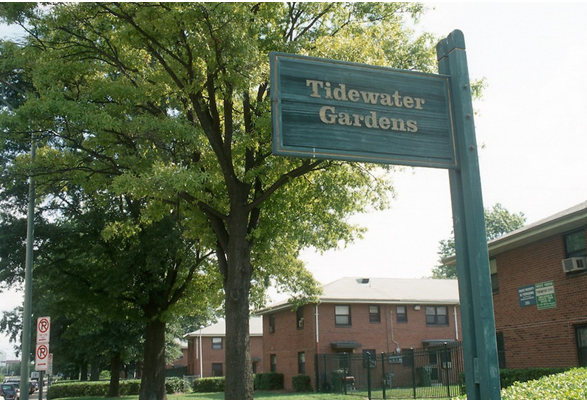Published June 16, 2025
Congratulations to People First USI, Norfolk’s Department of Housing and Community Development and the Norfolk Redevelopment and Housing Authority on being recognized as an outstanding recipient of the federal Department of Housing and Urban Development (HUD) Choice Neighborhood Initiative (CNI) Grant. Read the full article below
Beyond Housing: Building Career Pathways for Residents of Tidewater Gardens
The Tidewater Gardens Public Housing redevelopment in the St. Paul’s Area of Norfolk, Virginia, is a massive undertaking that will revitalize one of the most distressed and high-poverty areas in the region. As the City of Norfolk and Norfolk Redevelopment and Housing Authority (NRHA) break ground on the third phase of new mixed-income housing, they are doing so with resident success in mind and are investing beyond housing. According to Susan Perry, Director of the Norfolk’s Department of Housing and Community Development, “From the beginning of this project, people came first. Our goal was to provide residents with resources, programs, and opportunities… to succeed, whether they choose to return to the new community or move to another neighborhood.”

This commitment to resident success is demonstrated by the City of Norfolk’s People First initiative, which provides a major commitment of $3 million annually to support a range of strategies related to employment, health, education, and housing stability. While residents have achieved a wide range of positive outcomes, significant gains in income and employment are a stand-out achievement.
By the end of 2024, 76% of working-age residents had full-time jobs (compared to less than 50% in 2019), and the average wage exceeded $28,000, having doubled in five years. These gains ultimately help families achieve economic independence.
The secret to this program’s success can be attributed to the strong commitments from its partners, including Urban Strategies, Inc. (USI), the local Workforce Investment Board (WIB), and the city’s job resource center, Norfolk Works. These organizations worked closely with Tidewater Gardens’ residents to understand their challenges and personal goals, then helped them achieve those goals through job training, job coaching, building strategic relationships with employers, and securing jobs with sustainable wages.
How It Started
Located just east of downtown Norfolk, the St. Paul’s Area is home to approximately 1,600 Public Housing units and the region’s highest concentration of poverty. Built in 1955, the 618 units in Tidewater Gardens represent the first phase of the area’s broader redevelopment. Constructed atop the filled Newton Creek, more than half of the Public Housing site lies within the 100-year floodplain, leading to frequent flooding and impassable streets during high tide and significant rain events. Tidewater Gardens’ barracks-style, superblock configuration and lack of street connectivity also isolated the Public Housing community from the adjacent downtown area and neighboring communities.
Beginning in the early 2000s, the City of Norfolk and NRHA started planning for this community’s revitalization. They completed the St. Paul’s Quadrant Plan in 2005 and were awarded one of the first Choice Neighborhoods planning grants in 2010.
What became clear throughout the planning process was the importance of focusing on Tidewater Gardens’ residents—their health, education, and economic opportunities—along with new housing. Residents emphatically and repeatedly expressed their desire for more than better housing; they wanted a better quality of life. After more than 15 years of planning, with hundreds of meetings, focus groups, and events gathering input from Public Housing residents and community members, Norfolk received a $30 million Choice Neighborhoods Implementation Grant in 2019. Construction of the revitalized community, Kindred, is well underway and scheduled to be completed in the coming years.

Scale of Redevelopment
The redevelopment of Tidewater Gardens is a large-scale project, involving the demolition of existing Public Housing and construction of 714 multi-family apartments, walk-up buildings, and townhouses over 44 acres of land and 13 city blocks. The project includes major investments in green and public spaces—such as trails, sidewalks, new roadways and utilities, and a 22-acre park—along with new retail and office spaces along historic Church Street and the addition of public art installations that honor the culture and history of the area. Two key features of the redevelopment are the landscape improvements at Newton Creek and the introduction of a new street grid designed to better connect the neighborhood with Downtown Norfolk and the rest of the city.
Launching the People First Initiative
The City of Norfolk and NRHA made a clear promise to Tidewater Gardens’ residents: they would remain a top priority throughout the redevelopment process. To honor this commitment, the city dedicated $3 million annually from its general fund to support the People First initiative. Recognizing the importance of trust and transparency, the city and NRHA also agreed to engage a third-party operator to execute the program, with residents actively involved in the interview and selection process. In 2019, USI was selected to lead the initiative. USI oversees a holistic case management approach that helps families move from stability to long-term success. The initiative connects residents with a wide network of resources to support their educational, health, and career goals.
Because People First was funded with the city’s general funds, it had more flexibility than traditional federal funding. This flexibility has been key to developing deeper, more responsive programs that give families access to critical financial resources, especially during times of crisis. People First funds have been used to incentivize landlords to accept Section 8 Vouchers, remove barriers such as the cost of enrolling in trade school programs, driver’s license reinstatement fees, and unresolved utility bills. The initiative also supports resident relocation to other states with stronger family support systems, provides mental health and life skills counseling, purchases computers, and offers early childhood and college scholarships to participating youth.
Uniquely, People First funds allowed USI to go above and beyond by creating innovative programs tailored to address resident needs rather than dovetailing into an existing program. For example, the Dignity of Work Program was created specifically for Public Housing residents to receive five weeks of free training in the construction trades, receiving OSHA10, forklift, and flagger certifications, so that they can contribute to the rebuilding of their neighborhood.

How People First Works
Residents who participate in People First meet monthly with a family support specialist (FSS) from USI to understand their needs and co-create personal goals related to economic mobility, health, and education. By working one-on-one with families and individuals within each family, the FSS can create a foundation of trust and an open line of communication for ongoing case management.
The supportive services and case management provided under People First are personalized, ongoing, and hands-on, requiring significant staffing and resources. This includes eleven family support specialists, two education specialists, a workforce development specialist, a resident outreach worker, and two full-time city employees.
People First an Economic Mobility
A designated workforce specialist from USI works with residents to establish career goals that lead to sustainable living-wage jobs and determine what skills are needed for desired positions. To accomplish their career goals, the workforce specialist connects residents with workforce training and education programs, while simultaneously building relationships with employers and collaborating with the Workforce Investment Board (WIB) to make sure there is a pipeline of jobs that pay decent wages once residents are ready to work. The workforce specialist continues to offer ongoing support to ensure residents are successful in their new position.
Training and Education
USI’s workforce specialist established partnerships with the Tidewater Community College, local employers, and the WIB to provide residents with the necessary training to secure living-wage jobs based on Norfolk’s economic strengths. This includes employment in the shipyards, the healthcare industry, construction, and the world’s largest naval station complex, Naval Station Norfolk. USI and a city representative meet with the WIB and Norfolk Works on a bi-weekly basis to learn about upcoming job openings, trends in the regional economy, and training opportunities for residents. USI then coordinates with the community college and other training providers so that residents can obtain the necessary knowledge and certifications.
Soft Skills
Beyond technical skills, many of the residents needed to enhance their “soft skills,” such as working with others in a professional setting, time management, teamwork, and customer service. To meet this need, USI offered a Thriving Tuesdays Workshop, a four-week program that offered residents a two-hour “soft skills” training session every Tuesday and, upon graduation, they received a financial incentive and help with job placement.
Partnerships
To successfully improve economic outcomes for Tidewater Gardens’ residents, USI needed to make sure they had the proper training and there were jobs lined up for them. This required building partnerships with employers and workforce development agencies.
The City of Norfolk’s Economic Development Department, Norfolk Works, plays a pivotal role by offering workforce training and hiring incentives for high-demand positions. They also manage the Norfolk Workforce Investment Network (WIN), a system of service providers that assists with job placement and data-driven economic development strategies. By partnering with People First, the Economic Development Department champions the recruitment of diverse Norfolk talent to help support business attraction, retention, and expansion in the city.
Another critical partner is the Hampton Roads Workforce Council, the regional WIB who facilitates job placement by understanding the needs of employers and coordinating with USI to find suitable candidates. The WIB provides a crucial point of contact for local employers, who often look to the WIB first to hire new employees.
Additionally, USI works with the Tidewater Gardens’ developer, Brinshore Development, to ensure residents are hired for construction work and administrative positions, and with major employers in the region like the naval base, to build a pipeline of ready and capable employees.
Once a Public Housing resident is placed in a new position, USI continues to support them to ensure they are successful in their new job. This includes regular check-ins with the resident and the employer and providing conflict resolution if an issue arises.

Impact of People First on Economic Mobility
The success of Norfolk’s People First initiative is clearly conveyed in the data. Between 2019 and 2024, the percentage of able-bodied residents with jobs increased by 62%, with more than three out of four working-age residents now employed. Perhaps even more significant, the average wage of employed residents doubled from $14,000 to $28,000 annually over five years. This progress is tied in part to a deliberate focus on connecting residents with living-wage jobs that support long-term economic self-sufficiency.
Advice to Current and Future Grantees
The city and NRHA found they were able to accomplish more, and with greater focus, by working through the Choice Neighborhoods initiative. This collaborative approach allowed them to tackle common challenges together, with USI playing a key role in ensuring residents knew that there is “no wrong door to come to” for assistance. By working alongside each other, the city, NRHA, and USI directly support residents or refer them to the appropriate partner within their networks. According to NRHA Chief Development Officer Steve Morales, “Choice Neighborhoods aligns agencies and resources on a single mission that brings everybody together to coalesce around a project of this magnitude—the resources, attention, and focus is what it takes to get it done.”
The City of Norfolk’s Housing and Community Development Director, Susan Perry, and USI’s Operations Director, Nicole Brown, also offered this advice to new and potential grantees:
“Use the [Choice Neighborhoods] Program well and dream big. It is not just about replacing and building new housing—it’s something more. It’s about preserving the best elements of the former community, its wonderful people, rich culture, and deep history—while transforming the area into a vibrant, inclusive neighborhood that reflects the best of what the city has to offer. Choice Neighborhoods allows you to elevate the effort. And ‘Choice’ means offering residents options, giving them a seat at the decision-making table, and empowering them to choose how they succeed. Giving residents the power to choose is how you build a strong, thriving community.”
